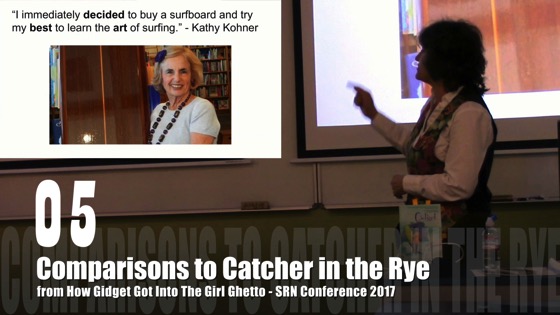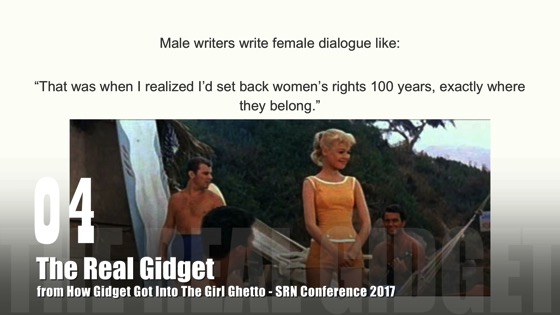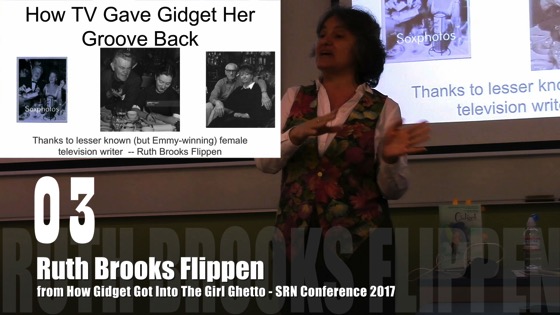Watch this entire presentation
Transcript:
So, we’ll start with the real woman. This is the real woman in the modern day. She’s still alive. She works in — she works as a Maitre D of a restaurant in Malibu and she’s still known as the “Real Gidget.” That’s kind of her — everyone in Hollywood is a bit of a celebrity so you can go that restaurant and meet the “Real Gidget” and have dinner. It is pretty funny. She also did a documentary a few years ago about her life that traveled the festival circuit. She’s trying to bring back the real story out of all the Hollywood glitz and glamour. So that’s Kathy Kohner and this was said about the book in the introduction and which I found very interesting. This is what connected me to it, that when it came out there was a thought that this was essentially a female Catcher in the Rye. Catcher in the Rye being the JD Salinger book that every high school student in America is still made to read and I don’t understand. It’s about a kid who decided whether or not to go to a hooker and I’m not really sure why that’s the most important book for teenagers to read.
At this year’s 10th Annual Screenwriting Research Network Conference at Otago University in Dunedin, New Zealand I presented…
“How Gidget Got Into the Girl Ghetto by Accident (and How We Can Get Her Out of it): Demoting Gidget: The Little Girl with Big Ideas from Edgy Coming of Age Novel to Babe on the Beach Genre Film via Choices made in the Adaptation Process.”
It’ a long title, as I joke up front, but covers the process of adapting the true life story of Kathy Kohner (nicknamed ‘Gidget’ by the group of male surfers who she spent the summers with in Malibu in the 1950s) into the film and television series that are better remembered than the novel. The novel had been well-received upon publication, even compared to A Catcher in the Rye, but has mistakenly been relegated to the ‘girl ghetto’ of films. Some of the adaptations turned the focus away from the coming of age story of a young woman who gained respect for her talent at a male craft – surfing – and instead turned the focus far too much on Kathy being boy crazy.
Along the way I found interesting comparisons between how female writers treated the main character while adapting the novel and how male writers treated the character.
Dr. Rosanne Welch
Dr. Rosanne Welch teaches the History of Screenwriting and One-Hour Drama for the Stephens College MFA in Screenwriting.
Writing/producing credits include Beverly Hills 90210, Picket Fences, ABCNEWS: Nightline and Touched by an Angel. In 2016 she published the book Why The Monkees Matter: Teenagers, Television and American Pop; co-edited Women in American History: A Social, Political, and Cultural Encyclopedia; and placed “Transmitting Culture Transnationally Via the Characterization of Parents in Police Procedurals” in the New Review of Film and Television Studies. Essays appear in Torchwood Declassified: Investigating Mainstream Cult Television and Doctor Who and Race: An Anthology. Welch serves as Book Reviews editor for Journal of Screenwriting and on the Editorial Advisory Board for Written By magazine, the magazine of the Writers Guild.
Watch Dr. Welch’s talk “The Importance of Having a Female Voice in the Room” at the 2016 TEDxCPP.
The Screenwriting Research Network is a research group consisting of scholars, reflective practitioners and practice-based researchers interested in research on screenwriting. The aim is to rethink the screenplay in relation to its histories, theories, values and creative practices.
Podcast: Play in new window | Download
Subscribe: RSS



![The “A Film By” Credit and Writers from Giving Voice to Silent Films and the Far From Silent Women Who Wrote Them with Dr. Rosanne Welch [Video]](https://rosannewelch.com/wp-content/uploads/2018/01/ufva-16-film-by.jpeg)








![Dr. Rosanne Welch presents Opening Remarks at The Industry in Our Backyard: Television Production in Los Angeles 1940s-1980s [Video]](https://rosannewelch.com/wp-content/uploads/2018/01/la-industry-backyard.jpeg)

![More on Goodrich and Hackett from Giving Voice to Silent Films and the Far From Silent Women Who Wrote Them with Dr. Rosanne Welch [Video]](https://rosannewelch.com/wp-content/uploads/2018/01/ufva-15-hacketts-2.jpeg)

![Frances Goodrich and Albert Hackett from Giving Voice to Silent Films and the Far From Silent Women Who Wrote Them with Dr. Rosanne Welch [Video]](https://rosannewelch.com/wp-content/uploads/2018/01/ufva-14-hacketts.jpeg)
![The “Capra Touch” and Writers from Giving Voice to Silent Films and the Far From Silent Women Who Wrote Them with Dr. Rosanne Welch [Video]](https://rosannewelch.com/wp-content/uploads/2018/01/ufva-13-capra-touch.jpeg)
![02 How TV Gave Gidget Her Groove Back from How Gidget Got Into the Girl Ghetto – Dr. Rosanne Welch – SRN Conference 2017 [Video]](https://rosannewelch.com/wp-content/uploads/2017/12/gidget-srn-02.jpeg)
![Writers Have Been Lost In Film History from Giving Voice to Silent Films and the Far From Silent Women Who Wrote Them with Dr. Rosanne Welch [Video]](https://rosannewelch.com/wp-content/uploads/2017/12/ufva-12-forgotten-writers.jpeg)